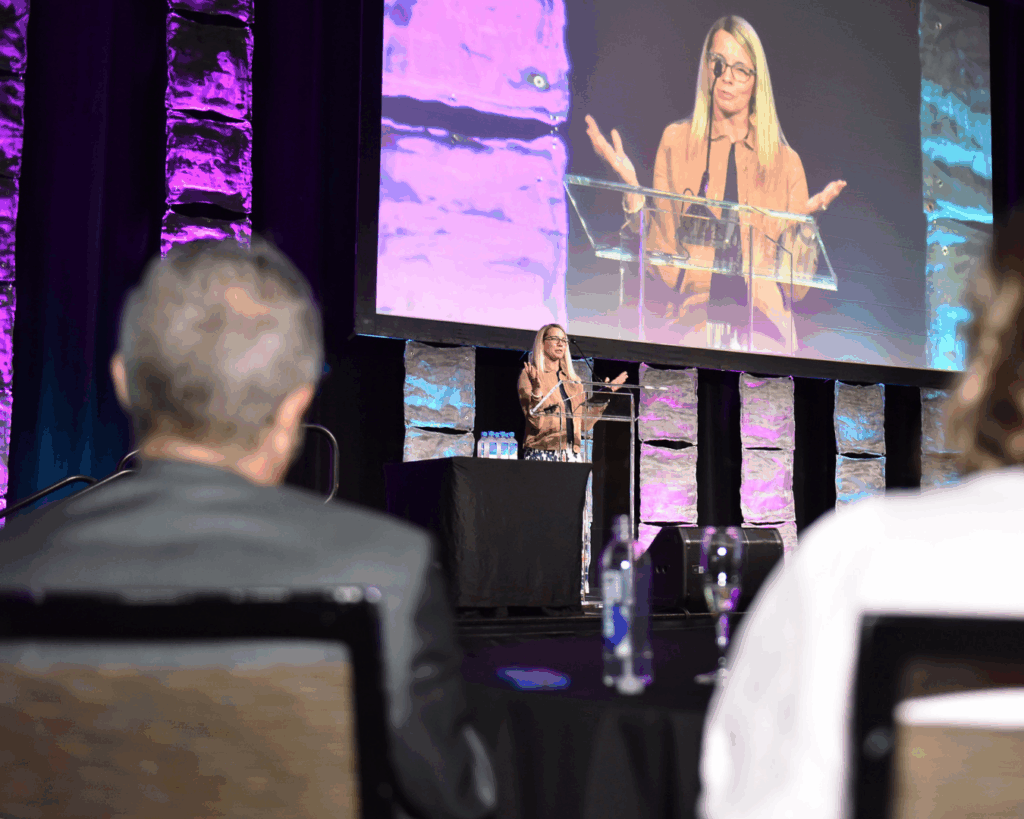Before I started working at the Online Learning Consortium, I attended many OLC conferences as a community member. My first time goes back to the 2010 Blended Learning Conference, where I nervously co-presented with my friend and mentor, Tanya Joosten. At that conference, I knew I had found my people—passionate educators and leaders obsessed with innovation and quality in digital learning. And then at the OLC conferences that followed, I noticed this kind of Goldilocks effect, where the events felt cozy and welcoming while at the same time were large enough to encompass a wide range of diverse topics and perspectives.
Now that I’m nearing the end of my fourth year at OLC, I’ve come to realize that most attendees probably don’t know about the inner workings of conference planning. For the most part, this is a good thing. We want you to think that our conferences are magical (think about where we usually hold Accelerate), and we don’t want you to notice those minor flubs that are expertly covered up by our team. My amazing colleagues Christine and Adelle—with the help of several other staff members and community volunteers (thank you!)—work for months and months to plan these inspiring and energizing events. So, as we gear up for the Accelerate conference in November, I offer you an insider perspective that I hope will expand your thinking about our conferences.
Food Is Our Biggest Expense
Not to throw shade on our hotel partners, but the reality is that conference hotels charge a lot more for things than you might expect. I was humbled at a staff meeting when we discussed how much OLC is charged for a 12-ounce (355 mL) can of soda. I spat out a number that I thought was ridiculously high: $4. “Higher.” $6. “Even higher.” I’ll spare you the entire exchange, but I learned that a can of soda costs the organization up to $14. This isn’t even due to hyper-inflation.
Another example: Coffee. Let’s say you went to Starbuck’s and ordered an 8-ounce Pike Place Roast for yourself and 15 of your closest friends. That is a gallon of coffee. At $3.65 per cup (not including tip), you’d spend $58.40. By comparison, OLC is typically charged $158 per gallon of coffee, for conference coffee at that. Everything is like this.
You might wonder why hotels charge so dang much for food and beverage. Well, hotels generally have high overhead costs and need to pay their people, their electrical bills, their real estate taxes, etc. The situation is similar to that of hospitals, where we’re charged $15 for a single tablet of Tylenol, when we could buy a year’s supply (generic, of course) for that amount.
I mention these costs not to guilt anyone out of a morning or afternoon beverage but to bring some awareness to the challenges we face in keeping our conferences affordable. Please understand that as a self-funded, non-profit organization, we have to share some of our costs with our community, which comes primarily in the form of registration. So asking why conference registration is so high is like asking why college tuition is so high. It’s definitely not by choice.
Sponors and Exhibitors Reduce Registration Costs
Ed tech vendors purchase sponsorship packages and booth spaces at our conference, which helps subsidize the cost of registration for our attendees. Ed tech vendors purchase sponsorship packages and booth spaces because they want to have meaningful conversations with attendees. Yes, they are looking for leads, and the more leads they have, the more likely they will come back and continue supporting our conference, but they want to engage with you to hear about your needs, your pain points, and your wish lists. So talk to them. You’ll probably find out that most vendors genuinely give a damn about student learning, just like you.
If you feel a bit of stranger danger, that’s okay. Striking up a conversation with a vendor takes some practice for us introverts. The easiest way into a discussion is to simply ask: “Can you tell me about your product?” Also, if you’re at an exhibitor’s booth just for the swag, it’s okay to be up-front about it, but it’s also a courtesy to provide your email address in exchange for that freebie. You can always unsubscribe from their promotions later.
We Really Do Need to See Your Badges
Conference badges allow us to determine who is legitimately attending our conference and who may be trying to scam us out of free (expensive—see above) food. I would almost respect someone if they tried to sneak in to listen to one of our many wonderful presenters, but some people want to avoid resort costs by taking our cantaloupe and those decadent croissants with the chocolate in the middle. As you might suspect, there are also serious liability and safety issues with randos—and even your kids or spouses—strolling through the exhibit hall. When you bring 1,300+ attendees together into a single space, accidents are bound to happen, and we want to keep everyone as safe as possible. So if you forget your badge in your hotel room, please don’t hassle the staff member or volunteer who asks you to retrieve it.
We Only Have So Much Control Over the Temperature
Sometimes the rooms are too hot. Sometimes they’re too cold. I find it annoying too, but we don’t have actual access to the venue’s thermostat(s); we can just make recommendations. Either way, I don’t envy the people having to regulate the HVAC in these huge conference halls. Definitely tell us if you’re freezing, but it doesn’t help much if you slam us on the end-of-conference surveys about chilly rooms. It’s like giving a one-star review to an amazing book you bought on Amazon just because the cover was bent in shipping. Not the author’s fault.
Our overall recommendation: Dress in layers.
It’s Who You Know
I wish I could say that any success I now enjoy is the result of natural brilliance, raw talent, and hard work, but the reality is that I owe a lot to a lot of people who have helped me advance my career. Some have been direct colleagues and supervisors, but many have been people I’ve met at conferences and through other events. Networking at conferences is essential for professional development and career-building. Our conference team does a marvelous job planning engagement activities that offer a little something for everyone, so take advantage of these low-stakes opportunities to connect with like-minded people at the conference.
Session Evaluations Are Super Important
I know it can be hard to find the time or to remember to fill out an evaluation after you attend a session. However, session evaluations are super important to presenters, who (often) travel from far away to share their ideas with (often) a bunch of strangers, and who want to have a sense of whether or not they did a good job. Furthermore, session evaluations are critical to the Best-in-Track selection process. Every year, OLC uses session evaluation data to determine which presenters in each of the tracks will receive a Best-in-Track award. A session with a low number of evaluations can’t even be considered, no matter how engaging and thought-provoking it was.
The good news is that for the Accelerate conference this year, we’ve reduced the session evaluations to one rating question and one open-ended question. You can give feedback in less than a minute. Some people like to do them right when the session ends; others will fill them out at the end of each day, all at once. Whatever your strategy, please help us and our presenters out by completing those session evals.
In Conclusion
Thank you for indulging me in this brief, behind-the-scenes look at just a few of the many factors that go into our conference planning. The OLC team hopes you have a transformative experience at our upcoming Accelerate conference at the Swan and Dolphin in November. We’ll see you there!
Dylan Barth is the Vice President for Innovation and Programs at the OLC. Dylan provides strategic vision and oversight for professional development, consulting, research and publications, and the Quality Scorecard Suite at OLC. He has 20+ years of experience teaching in higher education and 12+ years working in faculty and instructional development. Dylan holds a Ph.D. in English from the University of Wisconsin-Milwaukee with an emphasis on masculinities in contemporary post-apocalyptic fiction.





